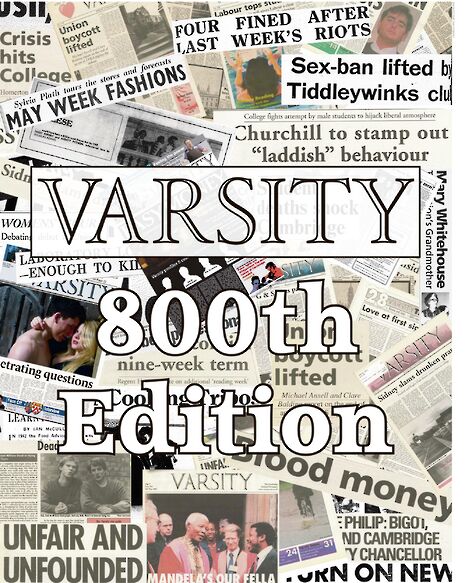Editorial: A storied history
As Varsity looks back over 800 print editions, it’s time to look forward

Sometimes it feels as if the university is creaking under the weight of its own history.
The same can be said of this newspaper, which bears a significant legacy. Significant too is the relationship between the university and its oldest surviving student newspaper; over the years, the focus for the latter has been, and remains, holding this ancient institution to account.
Varsity has scrutinised the university and those in positions of authority since its inception. In its first edition of 19th April 1947, reporting on the planned construction of a “huge” science centre on Lensfield Road, the paper noted the “storm of protest” raised by the university Syndicate’s report, and carried an article on pay rises for dons. That style of reporting continues today, with stories about the difficulties at the North West Cambridge development site, our exclusive on the sudden closure of the University Library’s bindery, and pieces holding national politicians to account when they visit the city. Remarks made in Cambridge, like those of Tristram Hunt, can be relevant nationally.
This is what makes the sheer number of letters written in by students so striking – not only do we hold institutions to account, but our readers afford us the same courtesy. Even today, eagle-eyed readers are quick to point out mistakes like the misnaming of Cambridge Universities Labour Club as the body for a singular university, and to criticise the way this excludes Anglia Ruskin University. Forgive us if, like all Cambridge students, we become at times a little closed-minded.
Student journalists have acquired a bad reputation for being an insular, self-involved clique; something Varsity might itself have been guilty of, as when it used to announce the appointment of the next term’s editor on its front page. But we exist only for our readers across the city and the university. We aim to produce the newspaper you want to read. If ever this is not the case, like your predecessors, let us know.
Mistakes have been made, and continue to get made. Our history is not an untroubled one – the paper went bankrupt shortly after Jeremy Paxman’s time at the helm in 1972, as circulation dropped under his successors. Varsity did not return in its original form until 1987. In 2012, under increasing financial pressures, the paper was forced to reduce its print run to fortnightly, only returning to weekly publication this term after finances improved.
The term’s successful return to weekly publication means that this edition, our final of the term, is also the newspaper’s 800th. With applications to become a section editor closing on Monday, there has never been a better time to get involved, regardless of prior experience.
Visit our website at www.varsity.co.uk/get-involved, or email me at editor@varsity.co.uk to find out more.
 News / Fitz students face ‘massive invasion of privacy’ over messy rooms23 April 2024
News / Fitz students face ‘massive invasion of privacy’ over messy rooms23 April 2024 Comment / Gown vs town? Local investment plans must remember Cambridge is not just a university24 April 2024
Comment / Gown vs town? Local investment plans must remember Cambridge is not just a university24 April 2024 News / Cambridge University disables comments following Passover post backlash 24 April 2024
News / Cambridge University disables comments following Passover post backlash 24 April 2024 Comment / Does Lucy Cavendish need a billionaire bailout?22 April 2024
Comment / Does Lucy Cavendish need a billionaire bailout?22 April 2024 Interviews / Gender Agenda on building feminist solidarity in Cambridge24 April 2024
Interviews / Gender Agenda on building feminist solidarity in Cambridge24 April 2024






